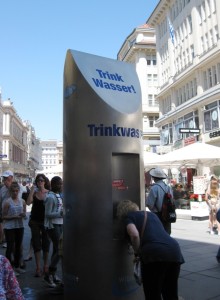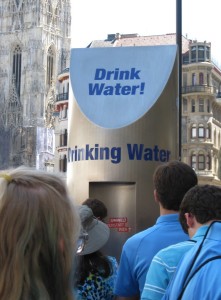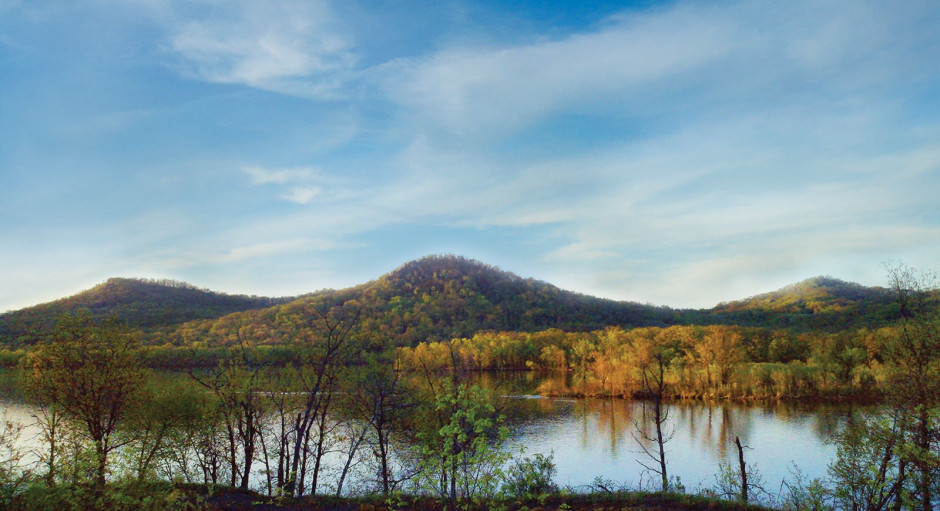
One of hundreds of public drinking fountains, fed by alpine glacial meltwater, slaking the thirst of Vienna’s citizenry and visitors. Photo P. Armstrong.
July 13, 2016. I just got back from a trip to Austria and the Czech Republic (my daughter was on tour with a youth choir and my wife and I were her groupies). One of the most memorable moments along the way was standing in line to drink from one of Vienna’s civic fountains. I am used to cities having fountains, but usually you are not encouraged to drink from them—in fact you are often told to stay out of them. But Vienna, unique among the cities of the world, enshrines the right to pure water in its civic constitution. The city receives 400,000 cubic meters of fresh spring water every day from two pipelines that lead up into the Austrian Alps. There are 900 permanent fountains in the city and a number of portable ones that are put on line if the weather is hot and the city is crowded. The Viennese are excessively proud of this: they tell tourists constantly “remember, you can drink our water! You don’t need to buy water!”
The roots of this go a long way back. I visited the Roman Museum by the city center where you are treated to animated engineering diagrams of the Roman aqueducts that once fed Vindobona, the Roman border fort that preceded the modern city of Vienna. The Romans were splendid plumbers (in fact the word plumber comes from Latin) and their military barracks had running water, as well as plumbed bathrooms and of course a Roman steam bath. Modern Vienna simply repeats the strategy of piping in mountain water on a much vaster scale.

On the reverse side, for people who speak English, Vienna’s public fountains urge you to stay well hydrated. Photo P. Armstrong.
What moved me most about this was the assumption that this was a civic right—and a matter of civic pride. In America we seem to have become incapable of taking pride in our infrastructure, in large part because infrastructure requires a communal effort—and after two or more decades of anti-governmental rhetoric we seem to have plunged ourselves into a spiral of anomie. The ultimate result of this, of course, is the water crisis in Flint, Michigan (which Kim has written about). In that shameful incident bureaucrats endangered the health of thousands to save some dollars. The city of Flint essentially became a sacrifice zone for the neoliberal economics that informs Michigan’s governance. But lesser examples of the same kind of thinking are everywhere, in every state: Americans don’t want to pay for their cities, their roads, their schools, or their parks. The American Society of Civil Engineers report card (http://www.infrastructurereportcard.org) gives our nation a “D” for drinking water—and in the wake of the Flint crisis new contaminated water systems are being discovered every day.
Vienna is not plagued by neoliberalism or fantasies of libertarianism—despite the fact that a lot of neoliberalism’s founding thinkers are from Vienna. Vienna has always been part of one or another empire, so it has gloried in what can be accomplished by concerted human action. The Viennese view their city as worth protecting and enjoying—and they also view it as connected to its natural surroundings. The Viennese have mastered the art of urban living in a way that combines the pleasures of the natural world and the pleasures of human culture. For instance, the famed Vienna Woods west of the city provide fresh air and plenty of space for outdoor recreation. Organic and local farming is all the rage (the city runs the largest organic farm in Austria). Well-funded public transportation means that Viennese are able to go on foot, saving energy and improving health. Vienna has been voted the best city in the world to live in several times—Americans could benefit from taking a look at their accomplishments. – Jim
